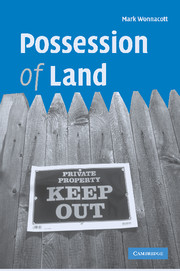Book contents
- Frontmatter
- Contents
- Preface and acknowledgments
- Table of cases
- Table of statutes
- Table of statutory instruments
- 1 Meaning of possession
- 2 Protection of possession
- 3 Possession, title and freehold land
- 4 Leases and licences
- 5 Mortgages and charges
- 6 Equity and trusts
- 7 Birth and death, dissolution and insolvency
- 8 Adverse possession and prescription
- 9 Possession judgments
- 10 Summary and conclusions
- Index
6 - Equity and trusts
Published online by Cambridge University Press: 13 August 2009
- Frontmatter
- Contents
- Preface and acknowledgments
- Table of cases
- Table of statutes
- Table of statutory instruments
- 1 Meaning of possession
- 2 Protection of possession
- 3 Possession, title and freehold land
- 4 Leases and licences
- 5 Mortgages and charges
- 6 Equity and trusts
- 7 Birth and death, dissolution and insolvency
- 8 Adverse possession and prescription
- 9 Possession judgments
- 10 Summary and conclusions
- Index
Summary
Introduction
This chapter is about the impact and effect of equitable rights on the common law of possession: the ways in which equity alters and restricts the common law, in favour of some, but not others.
It might seem old-fashioned to deal with this subject separately. But, where land is concerned, the difference between a legal right and an equitable right is still of critical importance.
Equitable rights in land can be divided into three types. The first is a right, recognised in equity, to possess the whole of a common law estate. The second is a right to some lesser equitable interest in a common law estate. The third is an equitable right to do something, in relation to land, that has no counterpart at common law at all.
This chapter explains why those distinctions are still important, and the remedies available to vindicate each type of equitable right.
The relationship between common law and equity
No one sitting down with a blank piece of paper, attempting to produce a rational and coherent property-law code, would produce that which the forces of history and the ingenuity of conveyancers have produced in England and Wales. It is possible that someone might decide that there should be a partial statutory code, and that judges should otherwise be permitted to develop the principles. But what no one could imagine would be a partial statutory code, supplemented by two inconsistent and competing systems of judge-made law, one to qualify and contradict the other.
- Type
- Chapter
- Information
- Possession of Land , pp. 91 - 106Publisher: Cambridge University PressPrint publication year: 2006



